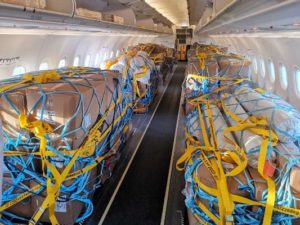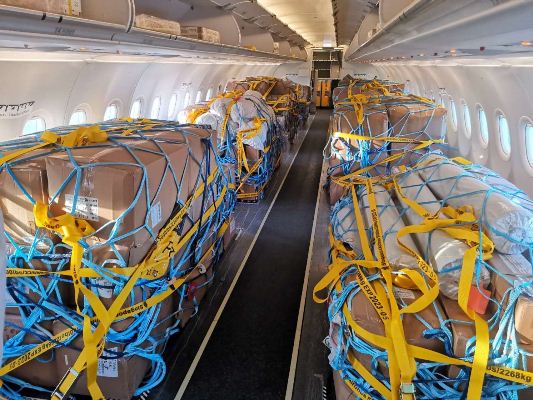
Scoot, the low-cost arm of the Singapore Airlines Group, has expanded its cargo-carrying capacity amid a decline in bellyhold space for cargo by modifying one of its aircraft to carry cargo in the cabin by removing all the seats.
The carrier removed all the seats from one of its A320ceo aircraft (9V-TAZ) to double the cargo-carrying capacity to nearly 20 tonnes. This is in response to the shortfall in bellyhold cargo capacity due to restrictions made to passenger flights as a border control measure against COVID-19, Scoot said in a release.
It took four days to modify the aircraft, which included removing the passenger seats, installing placards to demarcate areas where cargo can be placed, and uplifting additional fire extinguishers. At least two pilots and two cabin crew will be on board for flights operated with this aircraft to ensure safety and smooth operations, and manage any inflight emergencies.
The first cargo charter flight by the modified 9V-TAZ took off on August 22, 2020 from Fuzhou to Singapore, making Scoot one of the first airlines in Southeast Asia to operate cargo charters with such modified aircraft.
The aircraft transported a total of 13 tonnes of cargo in both the bellyhold and cabin, comprising mainly goods for daily use, and has four more flights scheduled for the rest of August.
Another A320ceo aircraft is scheduled to undergo similar modification works this week.
In March, Scoot was one of the first airlines in the region to start operating bellyhold cargo charters using its B787-9 widebody passenger aircraft. It has since been growing and diversifying its freight capabilities to offer more options to cargo agents, freight forwarders, and other industry stakeholders.
In May 2020, Scoot also started operating cargo charters using its A320 narrowbody aircraft, as well as loading cargo in the cabin, secured on passenger seats.
“With many passenger aircraft sitting idle due to the pandemic, Scoot started operating cargo charters to carry essential supplies as an alternative revenue stream. Since then, we have been growing our cargo capacity and capabilities to remain competitive while providing more value for our customers,” Scoot CEO Campbell Wilson said.
The modified aircraft will enable Scoot to mount freight services between Singapore and key trading markets. To date, the carrier has operated more than 200 cargo charters to and from 10 cities, namely, Fuzhou, Guangzhou, Hangzhou, Hong Kong, Kunming, Nanjing, Perth, Sydney, Taipei, and Wuhan.
Photo courtesy of Scoot





